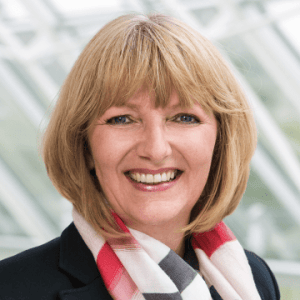Professor Sander: You are celebrating your 30th anniversary at the University of St. Gallen. What has changed for the better during this time?
When I came here 30 years ago, only 17% of the students were female, and there was only one female professor, if I recall correctly. Today women make up 35% of the student population and hold 13% of all professorships. We have also integrated topics such as sustainability, diversity and inclusion into our curricula, and it’s now possible to obtain a degree in English here.

Prof. Dr. Gudrun Sander
You attract many women to the University of St. Gallen and to its continuing education programmes. How do you do this?
In the area of continuing education, we have succeeded in doing this through the “Women Back to Business” programme, which has been in existence for more than 10 years. The programme supports highly qualified women who want to re-enter the workforce or switch to a more qualified position. In addition, we have been organizing role model events on the topic of Women’s Perspectives on Leadership and Career Development for years, where we show how various women’s career paths and leadership ideas can be. I am also often involved in mentoring programs for young women in companies and universities. These women regularly take part in the St. Gallen Leadership Day or attend other executive education courses at the University of St. Gallen. That makes me very happy that I can position the University of St. Gallen more positively with women.
Where is there still a need for action, where can we make more efforts?
In order to attract more young women to the University of St. Gallen, we need to show the diversity of the university to the outside world. We don’t just stand for banking and finance or strategy, we also have many exciting subject areas, especially in the Master’s programmes. We need to communicate this more strongly and also highlight role models who demonstrate how women who have studied here are involved in very different areas and how they have developed professionally.
Are we doing enough in the area of executive education at the Executive School?
Our flagship programmes are dedicated and strive to bring more women into continuing education. Last year, we passed the 30% mark. In some cases, we still need more flexible programme designs, more female lecturers, and a few content adjustments in our programmes, in order to attract more women in a targeted manner. It’s a snowball effect: the more good examples we can highlight in our communications, the more women feel addressed and are likely to come to us for their continuing education.
Recently there was a women’s strike – you witnessed the first one in 1991. How did you experience that?
There was quite an uproar at the University of St.Gallen. Some of the professors had forbidden their employees to take part in the strike. However, there were already a few committed women’s groups at the University, such as the Women and Management Forum or the Women and Science Discussion Group. So various rallies and activities took place after all. I was there, too, and what I remember most was the energy of the day. The motto was: “If women will, everything stands still”. That really became clear that day, and it showed all the unpaid work that women carried out – and still do today – as well as their many contributions to the workforce, although women in Switzerland were much more in the background 30 years ago than they are today.
What has changed since then for the better?
On the positive side, from my subjective perception: legal equality has been achieved de facto in Switzerland. The new marriage law of 1988, the Equal Opportunities Act of 1996, etc., have laid a good foundation here. Maternity insurance and maternity leave were introduced in 2005. It is also much more acceptable for women – even with small children – to remain employed, at least part-time. Thirty years ago in Eastern Switzerland and in large parts of the country, the motto was: “Either you quit work altogether after the birth of a child or you come back full-time”. Equal pay for work of equal value is at least enshrined in law now and has brought some corrections. I can still remember how a colleague told me 30 years ago that it was quite normal and ok for her to earn less for the same job than her male colleague, because he has a family to feed. That is unthinkable today and goes against the Equal Opportunities Act. Nevertheless, there is still a lot to be done, because we have still not fully achieved real equal pay in Switzerland. However, this is mainly due to the poorer advancement opportunities for women.
What has changed for the worse?
The pressure on young families has increased. They often feel left alone in the rush hours of life, because on the one hand, there are too few affordable and good childcare facilities available, and on the other hand, they have to accept disproportionately high losses in their professional development if they want to work part-time. The family continues to play an important role in Switzerland, but family models have become more diverse. The basic framework conditions, however, are often still based on the traditional family model, and hardly any adjustments have been made in these areas. There is an urgent need to change course at the political level, meaning: parental leave, individual taxation, more flexible pension solutions, etc.
What do we women have to fight for today?
I would like to mention three points in particular:
1. We need to fight against subtle degradations. In technical jargon, we speak of unconscious bias. The achievements of women and men are still perceived differently. Women are still considered less capable than men. The few women in top management positions are under the highest scrutiny and are punished more severely than men in such roles.
2. We need to fight for more flexible work and pension models. I like to think of wavelike careers where young people take off after graduation, gain international experience, etc. Then perhaps there will come a phase of starting a family, continuing one’s education, or taking on a political commitment, which will bring with it a continued high level of professional commitment, but perhaps with less availability in terms of time. At the age of 40, people may feel like relaunching their careers, reorienting themselves, increasing their workload again or starting up a company. Then at around the age of 60, they may gradually reduce their professional commitment in favor of other activities, and at some point after 70 actually retire.
3. We need to fight for sufficient and affordable childcare and parental leave that supports a partnership-based division of roles within the family. This also includes introducing social benefits for unpaid childcare work in Switzerland.
Your advice to women?
There has never been a better time to live as a woman in Switzerland than today. Don’t be so critical with yourself, think long-term, and be committed to the projects you are passionate about.
Your advice to the business world?
Make even greater use of the potential and commitment of women, but also of other previously marginalized groups, and advocate for an inclusive work culture. In the future, we will need EVERYONE in order to remain competitive.
About the author(s)

Relevant executive education
Newsletter
Get the latest articles directly to your inbox.
Share article
More articles
The Future of Work and the Central Role of Diversity & Inclusion
Leadership in Transition: Five Trends of Modern Leadership
The future of work – also relevant for the legal market?
Why inclusive leadership matters for every generation
Do young lawyers need leadership, too? Classification according to generations – slightly arbitrary, but useful


